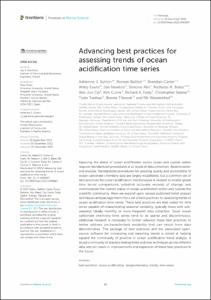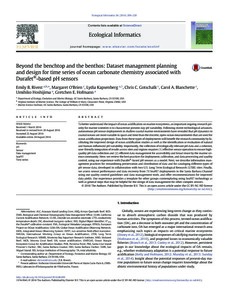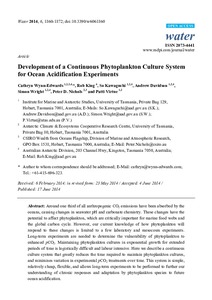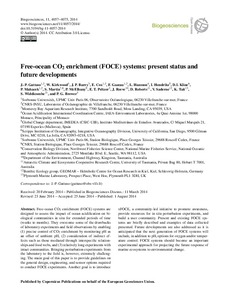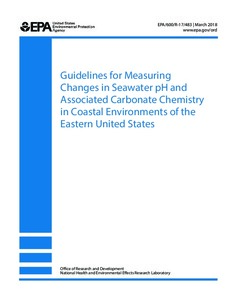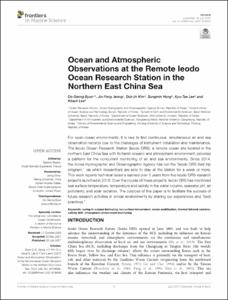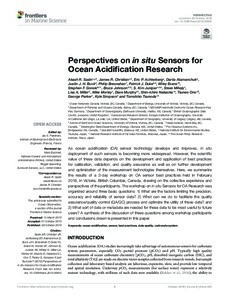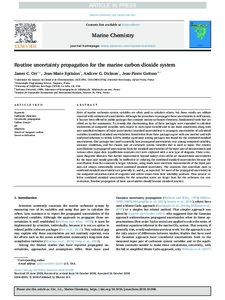Browsing Miscellaneous Community Practices by Subject "Ocean acidification"
Now showing items 1-11 of 11
-
Advancing best practices for assessing trends of ocean acidification time series.
(2022)Assessing the status of ocean acidification across ocean and coastal waters requires standardized procedures at all levels of data collection, dissemination, and analysis. Standardized procedures for assuring quality and ... -
Advancing real-time pH sensing capabilities to monitor coastal acidification as measured in a productive and dynamic estuary (Rıá de Arousa, NW Spain).
(2022)Ocean acidification has critical impacts on marine ecosystems, but presents knowledge gaps on the ecological impacts requiring large-scale monitoring of physicochemical conditions to predict biological responses to ocean ... -
Beyond the benchtop and the benthos: Dataset management planning and design for time series of ocean carbonate chemistry associated with Durafet ® -based pH sensors.
(2016)To better understand the impact of ocean acidification on marine ecosystems, an important ongoing research priority for marine scientists is to characterize present-day pH variability. Following recent technological advances, ... -
Development of a Continuous Phytoplankton Culture System for Ocean Acidification Experiments.
(2014)Around one third of all anthropogenic CO2 emissions have been absorbed by the oceans, causing changes in seawater pH and carbonate chemistry. These changes have the potential to affect phytoplankton, which are critically ... -
Free-ocean CO2 enrichment (FOCE) systems: present status and future developments.
(2014)Free-ocean CO2 enrichment (FOCE) systems are designed to assess the impact of ocean acidification on biological communities in situ for extended periods of time (weeks to months). They overcome some of the drawbacks of ... -
Guidelines for Measuring Changes in Seawater pH and Associated Carbonate Chemistry in Coastal Environments of the Eastern United States.
(U.S. Environmental Protection Agency, Narragansett, RI, 2018)These guidelines are written for a variety of audiences ranging from shellfish growers interested in monitoring pH with inexpensive equipment to citizen monitoring groups to advanced chemistry laboratories interested in ... -
How to document - Ocean Acidification Data.
(2016)The number of ocean acidification (OA) studies has increased significantly over the last decade. Most of this was due to studies on biological responses of organisms to OA. The lack of a protocol to document biological ... -
Ocean and Atmospheric Observations at the Remote Ieodo Ocean Research Station in the Northern East China Sea.
(2021)For open ocean environments, it is rare to find continuous, simultaneous air and sea observation records due to the challenges of instrument installation and maintenance. The Ieodo Ocean Research Station (Ieodo ORS), a ... -
Perspectives on in situ Sensors for Ocean Acidification Research.
(2019)As ocean acidification (OA) sensor technology develops and improves, in situ deployment of such sensors is becoming more widespread. However, the scientific value of these data depends on the development and application ... -
Routine uncertainty propagation for the marine carbon dioxide system.
(2018)Pairs of marine carbonate system variables are often used to calculate others, but those results are seldom reported with estimates of uncertainties. Although the procedure to propagate these uncertainties is well known, ... -
Satellites will address critical science priorities for quantifying ocean carbon.
(2020)The ability to routinely quantify global carbon dioxide (CO2) absorption by the oceans has become crucial: it provides a powerful constraint for establishing global and regional carbon (C) budgets, and enables identification ...
 Repository of community practices in Ocean Research, Applications and Data/Information Management
Repository of community practices in Ocean Research, Applications and Data/Information Management
